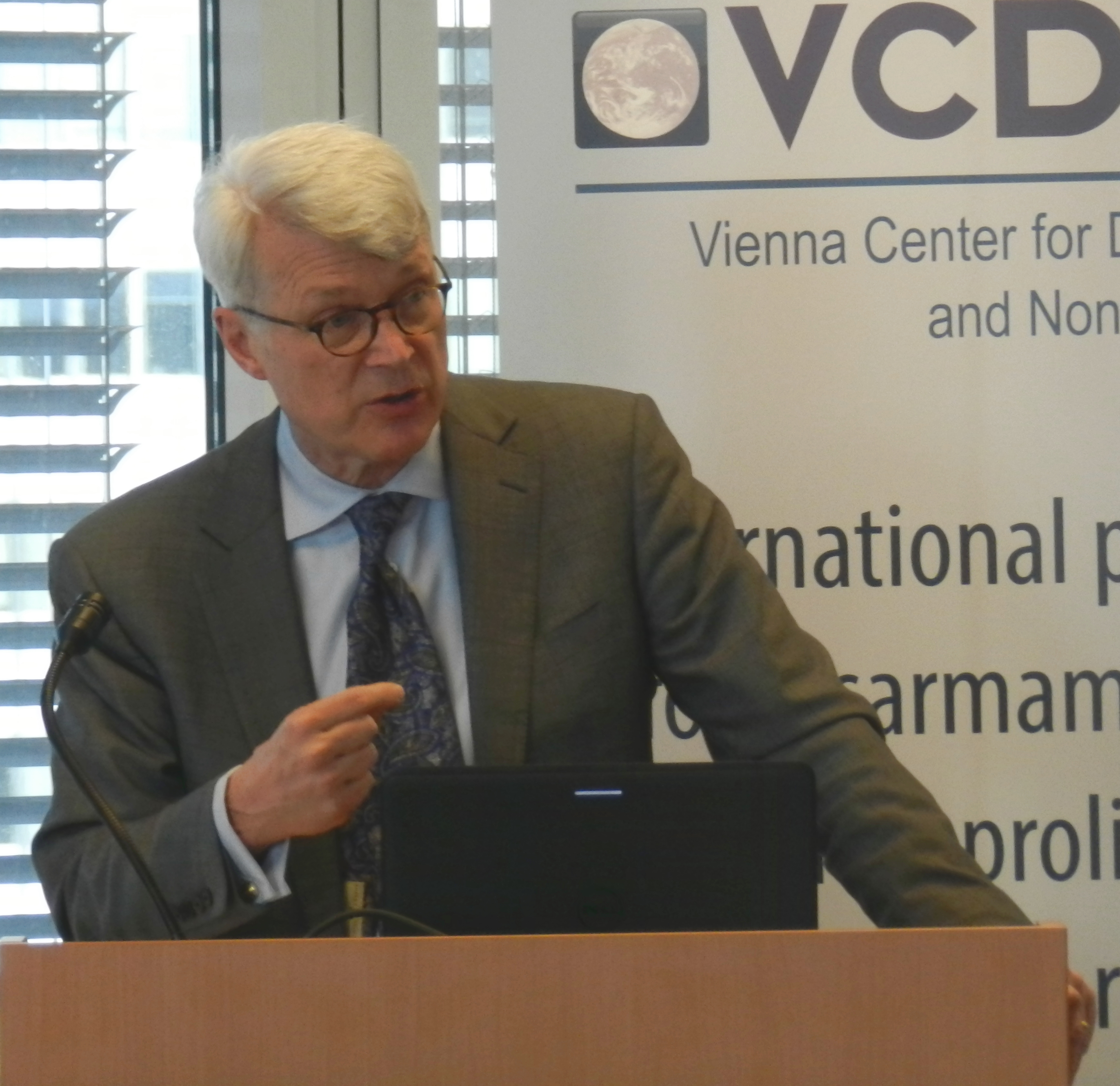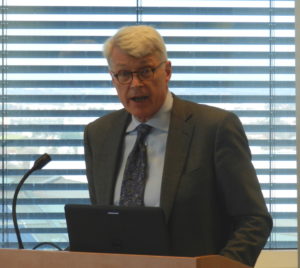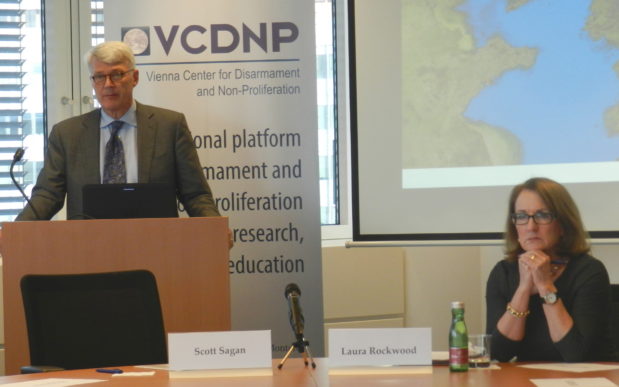
On 28 November 2017, the VCDNP held a seminar by Scott D. Sagan, Caroline S.G. Munro Professor of Political Science and a Senior Fellow at the Center for International Security and Cooperation at Stanford University. The seminar, entitled “The Korean Missile Crisis: Why Deterrence Is Still the Best Option,” built on his recent article in Foreign Affairs. VCDNP Executive Director Laura Rockwood moderated the seminar.

At the outset, Dr. Sagan highlighted that he was “deeply worried” about the state of relations between North Korea and the United States and the risk of war. In his opinion, it is high time for the U.S. administration to acknowledge that its efforts to prevent North Korea from acquiring nuclear weapons have failed and recognize that the issue has become a deterrence, rather than non-proliferation, problem.
“One piece of good news,” Dr. Sagan noted, was that similar situations have occurred in the past. In particular, the United States contemplated preventive strikes to keep the Soviet Union, and then China, from acquiring nuclear weapons. However, the military options were eventually rejected, and the United States learned to live with those two nuclear states.
The speaker then outlined “a number of pieces of bad news.” First, such risks as accidents, false warnings, and volatile leaders could all create a disaster. Second, senior officials in the Pentagon and the White House face a novel challenge: they must deter not only Kim Jong Un but also Donald Trump from starting a war. Third, nuclear deterrence is not thought of properly today. Proper deterrence, according to Dr. Sagan, requires not only a credible threat to retaliate in case of an attack but also a credible commitment not to start a war first. The most worrisome scenario in this regard is that North Korea might perceive that it is under an imminent and unavoidable attack and decide to launch a pre-emptive strike.
Comparing the current standoff with North Korea with the Cuban missile crisis, Dr. Sagan noted that he did not share other scholars’ view that the Korean issue is “the Cuban missile crisis in slow motion.” Rather, he considered the current situation even more dangerous for the following reasons. First, Fidel Castro did not have nuclear weapons while Kim Jong Un possesses around 60 warheads. Second, while Castro was a volatile leader, both Nikita Khrushchev and John F. Kennedy were more prudent and calm. Today’s crisis involves two volatile leaders with nuclear weapons - Kim Jong Un and Donald Trump, both of them rational but ruthless. Dr. Sagan added that the situation is aggravated when senior officials are not able to speak truth to power. Third, during the Cuban missile crisis the US military insisted on a military solution whereas civilian leaders opted for more cautious course of action. The current situation is the opposite in that the US military leaders find it necessary to publicly tone down the rhetoric, while the president and senior civilian officials speak of “all options on the table” and use language that could be interpreted by North Korea, and others, as a threat of a pre-emptive nuclear strike. Statements such as Trump’s boast that North Korean “threats” will be met with “fire and fury,” Dr. Sagan argued, break with the US deterrence policy and create further instability. Dr. Sagan also discussed a hidden crisis of civil-military relations in the United States, caused by the president’s volatility, where the military leaders have to perform the unusual task of constraining a civilian leader. He suggested in this regard that senior military leaders should be prepared to ignore belligerent tweets, push back against imprudent policies, and resist any orders that they believe reflect impetuous or irrational decision-making by the president. He also noted that the US Constitution’s 25th Amendment lays out procedures on how to relieve an impaired president of his responsibilities.

In arguing for deterrence as the best option for North Korea in present circumstances, Dr. Sagan reviewed several possible scenarios involving military action and highlighted the disastrous consequences of such actions. For example, an assassination of Kim Jong Un would be “a gamble of epic proportions,” as he could have already ordered his generals to launch an all-out strike in the event of his death. A “surgical” conventional attack on North Korean missile test sites or storage facilities is also an unreasonable option, as it is unlikely that the United States would be able destroy all the missiles in one strike. Such an attack would likely produce nuclear retaliation against the United States and/or its allies. A war on the Korean Peninsula would also have a devastating human cost, even if limited to non-nuclear means. While the job of the military is to come up with options, which involves “thinking the unthinkable,” Dr. Sagan pointed out, it is also the military leaders’ responsibility to offer brutal honesty to political leaders and the public. In North Koreas case, this means admitting that there are no viable military options.
In concluding his presentation, Dr. Sagan said that the United States should accept and learn to live with the nuclear status of North Korea, although the goal should be its eventual denuclearization. He underscored that such “acceptance” did not mean an end to worrying but rather should involve constantly thinking through and addressing all risks. The United States can successfully deter Kim Jong Un, convincing him that starting a war would lead to an unmitigated disaster for North Korea and a swift and violent end of his regime. Along with deterrence, Dr. Sagan also pointed out the importance of enhancing nuclear non-proliferation, anti-smuggling, and arms control initiatives.
This event was live streamed. The video can be viewed here.
By continuing to use the site, you agree to the use of cookies. more information
The cookie settings on this website are set to "allow cookies" to give you the best browsing experience possible. If you continue to use this website without changing your cookie settings or you click "Accept" below then you are consenting to this.